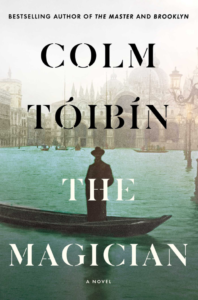
Tòibín wades into fertile territory by attempting an expansive biographical novel of Thomas Mann and the broader circle of his family. The Magician reflects the extensive research by the author in crafting this engaging and informative novel. However, remembering that it is a novel, it reads more as a biography attempting to look to the more emotional and human aspects of the story than a chronological examination of the themes or motivations of the author-subject.
Thomas Mann was the progenitor of a clan of exceptional and individuals in their rights. As a Nobel laureate and an outspoken critic of the rise of fascism is ripe territory for exploration. Tòibín produces a novel that focuses on posthumously uncovered diaries that revealed Mann’s private homosexual reflections and become a critical narrative arc for the story. One develops a sense that Mann floats along in his world with little control over his destiny.
The novel opens with a young Thomas living in the shadow of his older brother Heinrich. The machiavellian Thomas attempts to inveigle his way into becoming his father’s favourite and the one chosen to inherit the family concern. However, on his father’s passing and the resulting will largely disinheriting the mother and her children, Thomas seems to become a pawn of his times, forced but never seeking to speak out or to influence. This behaviour appears to fly in the face of an accepted appreciation of his life and paints a discordant view of Mann’s subsequent life. Mann seems to be a hostage of homosexual stirrings that he can rarely act upon yet preoccupies (if not controls) his existence. Books, which earned him the Nobel prize in literature, are presented with little apparent effort or more profound reflection. I am not sure this is Tòibín’s intent, but this seems an odd realisation.
The novel is quite readable, and Mann’s eldest children are well characterised. The wider tale is colourful, engaging, and leaves the reader satisfied for having read, although possibly unconvinced, based on the evidence presented that he lacked self-determination or a desire to speak out publicly against fascism. For example, his decision to speak in the nascent East German Republic on a speaking tour celebrating the Goethe centenary in opposition to shadowy advice from the US State Dept not to seems contradictory to the character developed over the bulk of the novel.
Ultimately, the novel is expansive, engaging, but the author’s own editorial decisions may seem contradictory to some readers – myself included. Nonetheless, it does raise these questions, provokes reflection, and thus serve as an effective vehicle to further understanding.
